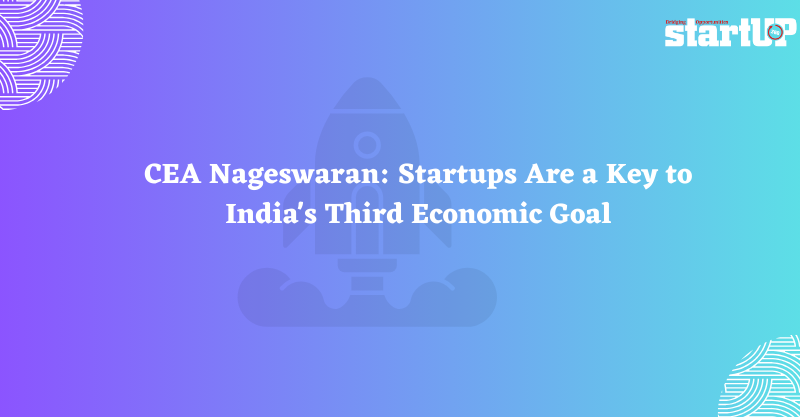CEA Nageswaran: Startups Are a Key to India’s Third Economic Goal
According to V Anantha Nageswaran, the Union government’s Chief Economic Advisor (CEA), startups will be crucial to India’s third economy goal. As per a KSUM statement, Nageswaran stated that tier-2 and tier-3 cities, which includes the capital of Kerala, have revolutionised the startup ecosystem in the nation by providing improved facilities and encouraging policies from the government.
During his Leadership Talk on the final day of the Huddle Global 2023, which was held by the Kerala Startup Mission (KSUM), the Chief Economic Advisor (CEA) stated that India’s economy is currently the fifth largest but is expected to rise to the third rank in the next years.
“In fact, I believe the popular phrase is 7-in-7, which stands for a 7 trillion dollar economy in seven years. If India continues on its current growth track, its economy might reach seven trillion USD by 2030. Startup entrepreneurs would be crucial to this endeavour, the announcement quotes him as saying.
According to him, India’s startups will continue to provide efficiency, income, and economic returns as long as they actively engage in creating business models based on the nation’s growing physical and digital infrastructure.
The Indian startup scene has changed dramatically over the past ten years, becoming the third largest ecosystem in the world with over 1.12 lakh startups currently recognised by the Department for Promotion of Industry and Internal Trade (DPIIT) in 763 districts.
He claimed that more than 110 of them were unicorns, valued at a combined approximate value of USD 350 billion.
The nation is ranked second in the world for innovation quality, according to the CEA.
According to him, startups in 56 industrial sectors—13 percent from IT services, 9 percent from health and life sciences, 7 percent from education, 5 percent from agriculture, and 5 percent from food and beverages—are finding solutions to problems, demonstrating that innovation in India is not just confined to certain industries.
Nageswaran added that it was noteworthy that 49% of the companies were from tier-2 and tier-3 cities, which have since changed the game because of their business advantages over tier-1 cities, which allow entrepreneurs to operate at lower prices.
He stated, “The availability of a technically skilled talent pool is a huge advantage for startups to set up and flourish in tier-2 and tier-3 cities, aside from improved infrastructure and the government’s pro-active policies.”
According to him, there used to be a belief that tiny towns were unsuitable for conducting business.
He remarked, “But this is no longer true with improved internet penetration, significantly better physical infrastructure, road, rail, and air connectivity, and supportive government policies.”
He added that Kerala’s entrepreneurship experience has been motivational.
According to the CEA, since its founding in 2006, KSUM has acted as a catalyst for change, pushing the state to the forefront of the global startup scene.

